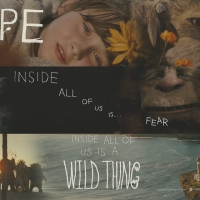Director Zak Hilditch’s Netflix original film, 1922 (based on Stephen King’s novella), reveals the harrowing course of thought it takes for a man to execute a murder and the extreme and near tangible burden that burrows deep inside his conscious afterwards. Set in small town Nebraska, Wilfred James (Thomas Jane) and his wife, Arlette (Molly Parker) are at ends with each other about selling their newly inherited land and leaving for the city versus combining their acres and staying put on the farm. Wilfred, who had come to hate his wife, convinces his adolescent son Henry (Dylan Schmid) to take part in murdering Arlette after Wilfred sees no other option. The sequence of events unfurls messier than anticipated, yet they remain secretive about the death of Arlette to their friends, neighbors and townsfolk. However, Wilfred gradually comes to realize that murdering his spouse accumulates more troubles and psychological guilt than he cares to admit. 1922 is a slow-burner not meant to horrify and shock but rather aimed at posing the harsh reality of consequences and the internal terrors that live within our narrator long after the crime have been committed.
Within the first twenty minutes of the film, the audience can already anticipate what’s to come. Despite there being minimal build-up leading up to the murder, 1922 uses context and setting effectively to understand why Wilfred feels like he has no other choice. Critiquing the city as a place for fools and having little experience other than farming, Wilfred is adamantly against moving to an urban area after Arlette’s father passed and left her with a rich plot of land. Stating that a man’s entire pride boiled down to his land and his son, there’s nothing that Wilfred desires more than his farm one day falling into the hands of Henry. These stifling and isolating conditions paired with his simple ambitions make for a stark decision in ridding the only thing (or person) posing as an obstacle against his ambitions. Events spiral downward once he realizes that committing a murder is less efficient than assumed, not taking into account the townsfolk’s questioning and his son’s impulsive behavior that ultimately leads him to run off with his girlfriend Shannon (Kaitlyn Bernard) after getting her pregnant.
Minimal in essence yet powerful in its use is Mike Patton (Faith No More, Tomahawk, Mr. Bungle)’s score to 1922. A flickering of orchestral strings and skittish bursts of creaks and groans make the soundtrack breathe ominous life into Wilfred’s house and at times even seems to operate in response to the inner workings of his sinned conscience. Our antihero’s anguish takes on the form of continuous rat-infested images, unrelenting in their terrorizing of Wilfred after burying his wife as well as during his confinement while writing his confession. Unable to discern what is real and what is not, the increasing number of vermin haunting Wilfred start to eat away at him not only mentally but physically. Compared to King’s other film adaptions that have been released this year, 1922 stakes its claim in its brooding and bleak outlook, a work where its horrors lie embedded in the inescapable thoughts you can never tear yourself away from.




